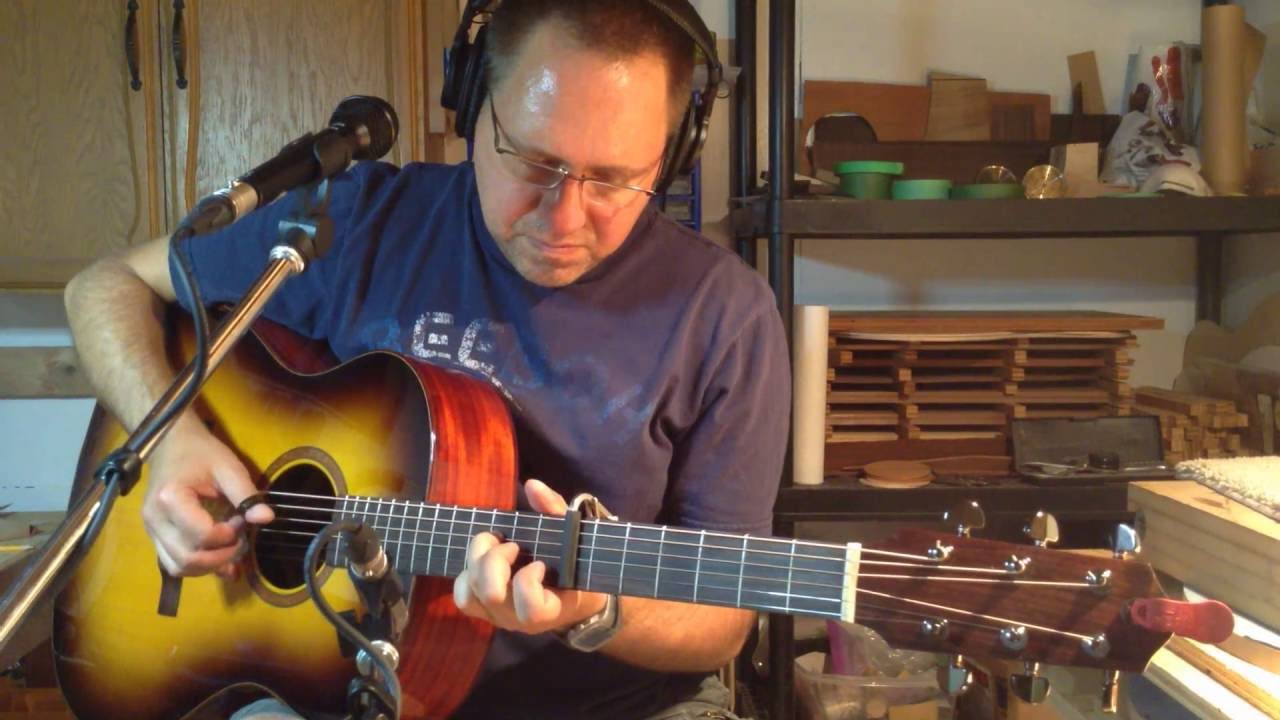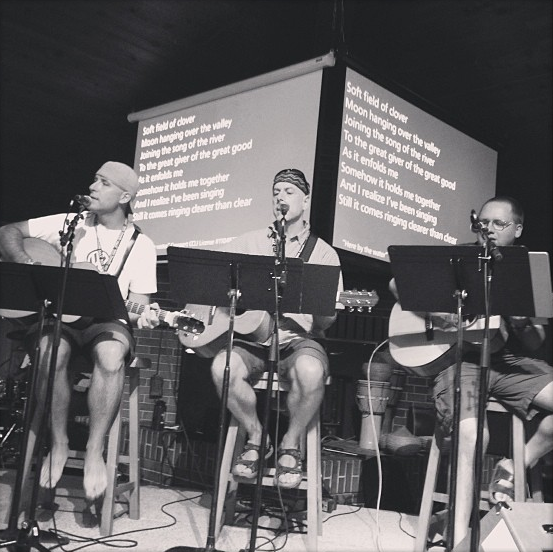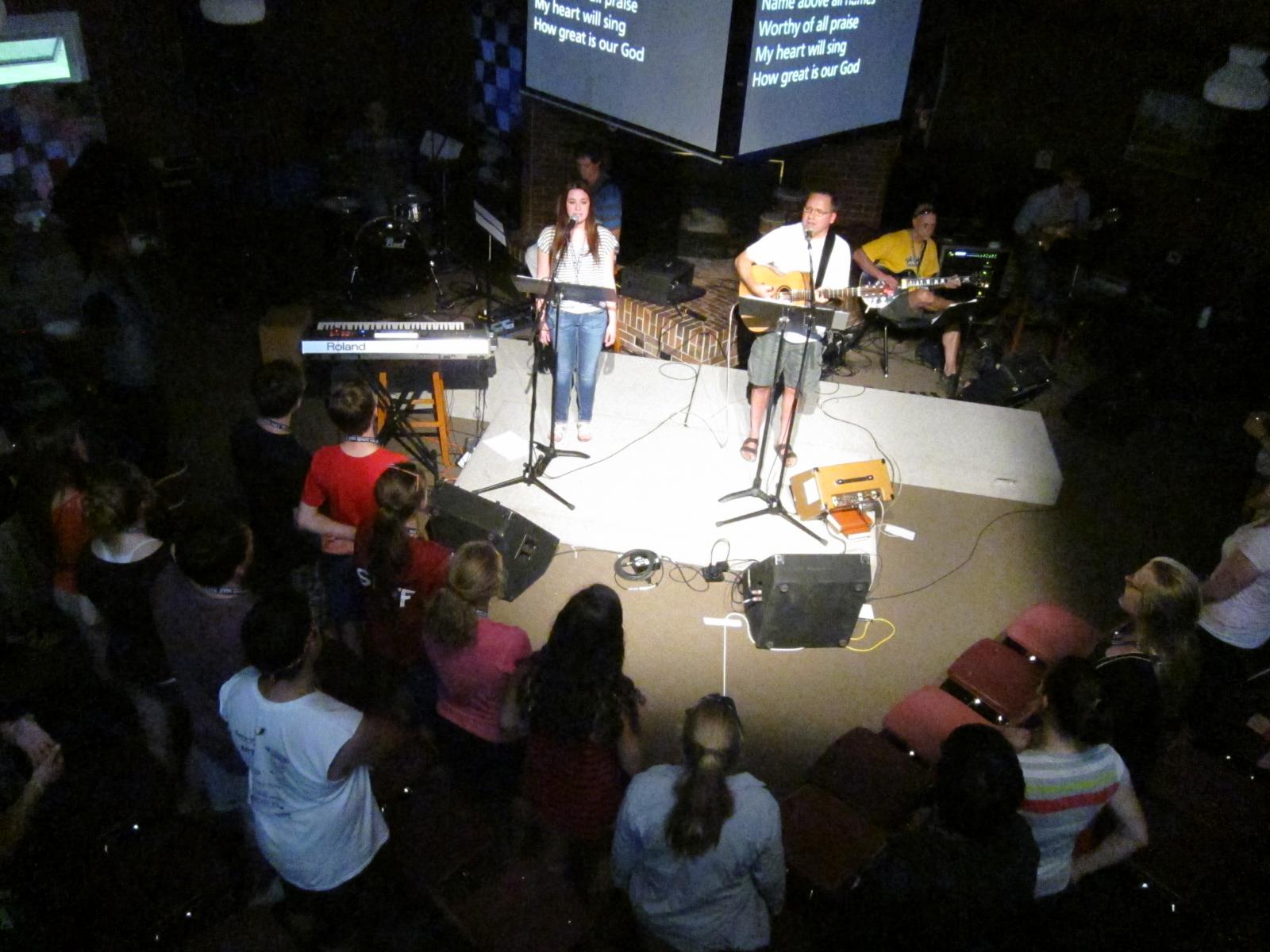

Phil Campbell-Enns: Singing a new song
When he isn’t working as the associate pastor at Bethel Mennonite Church in Winnipeg, Phil Campbell-Enns (CMBC ’89) has two fascinating hobbies: building guitars and writing songs.
If it weren’t for his time as a student at Canadian Mennonite Bible College, it’s quite possible he wouldn’t have these interests. It’s at CMBC, after all, that he first picked up the guitar.
During his third year at CMBC (one of CMU’s predecessor colleges), Campbell-Enns lived with three roommates: two who played guitar and one who played bass. They tried to convince Campbell-Enns to buy a drum set and learn to play so that the four of them could start a band.
Campbell-Enns figured if he was going to pick up an instrument, it would be an instrument he would enjoy playing on his own.
After talking about it with his parents, his mother asked him a question: If they bought him a guitar for Christmas, would he play it? The answer was yes.
“It was my mom taking me seriously on it that got me into the guitar,” Campbell-Enns says. “It was a cool gift.”
Today, he is a hobbyist luthier who has built around 16 guitars since 2000. As he notes on his website, he plays the first one and the rest have ended up in the hands of friends, or friends of friends.
“Some of those guitars have traveled professionally to many gigs around the continent,” he says. “Some have gone as far as Africa and South America and lived to tell the tale. One was turned into match sticks by WestJet. One is a workhorse in a professional recording studio. Some of them are used for leading worship, and some are faithful song writing companions for their owners.”
Campbell-Enns is a songwriter himself. His work is a reflection of the Anabaptist/Mennonite Church, with lyrics that emphasize God’s love and desire for peace and justice.
During a two-month sabbatical last year, Campbell-Enns made video recordings of himself playing 25 of his songs in his workshop. His friend Bill Derksen, a retired music professor, notated scores for each.
Now, Campbell-Enns has made his songbook available on a website, complete with vocal scores and chord charts. Some songs even have piano and harmony parts. His hope is that music leaders will be able to use the songs in worship.
We spoke with Campbell-Enns about guitar building, songwriting, and why he’s made his music available for congregations to use at no cost. This is what he had to say.
On why he started building guitars:
In the summer of ’99, my wife Heather and I were in Ottawa and I had a chance to play hand built guitars, and I realized how much better they were than the other ones – that there was just a different quality to them. I came close to pulling the trigger on buying one, which would have obliterated the need to make one. I remember that being the decision at the time: I could either dig deep and find the money to buy one, or I could have the adventure of trying to build one.
On the learning curve that comes with guitar building:
The first couple years are just equal parts thrill and frustration. I’d be in the workshop, and the guitar-building hobby would be as time consuming mentally as my job was. When something goes right it’s just awesome. When something doesn’t go right, I can feel myself heat up. I’ve basically had to destroy completed guitars because I’ve realized they just were not going to work. There is one guitar that’s basically all done, but I’m just never going to finish it – I’m digging up the courage to throw it in the fire. It’s not the worst though, right? It’s a couple hundred bucks of material, it’s maybe 100 hours of work. We’ve all wasted that much time. The guitar forum people talk about it as tuition; if you haven’t paid for luthier’s education but a side breaks on you and it’s expensive wood, chalk it up to tuition. Most of us with our hobbies don’t want to spend that much time frustrating ourselves, but that’s a part of this hobby. On the other end, to get to see someone like (Royal Canoe guitarist) Bucky Driedger make music with a guitar that I built makes it worth it.
On being a luthier and a musician:
It’s been amazing to put guitar building together with songwriting. There are a lot of awesome guitar builders that don’t play music and surprisingly, a lot of musicians that have no clue how their instrument is put together. I just think it’s so lucky to have a hand in both of those things. I don’t know if either truly makes me better at the other one, but I think it’s a really cool combination.
On how the music he writes is intended for the church:
If it hasn’t been (written for the church), it hasn’t seen the light of day. There have been a few other things written along the way but I have no interest in learning to be a performer, you know? I don’t think there’s anything in me that has a need to get out at a coffeehouse and play my own music. The stuff that I share with other people is meant to be sung by congregations. If I’m thinking of where the melody should go, or how tricky it should become, or how simple or repetitive it should be, that’s usually with a group of people in mind.
On why writing songs from an Anabaptist/Mennonite perspective is important to him:
Music is such an important part of Mennonite churches, but it’s almost always done as interpreters of somebody else’s music. We’re known to put together awesome choirs and have congregations that sing like choirs, but it’s rarely to our own tunes or to our own theology. Scripture’s instruction is to sing a new song, right? It’s not, ‘Borrow somebody else’s music and try to do the best you can.’ There is something in me that feels like, let’s take that seriously. Let’s not just keep borrowing other people’s music. We are great interpreters – no doubt about it. We have good conductors, good voices, but there is something thrilling about hearing words and melodies that have never been uttered before.
On why he’s made his music available for congregational use free of charge:
That was the idea from the beginning with the sabbatical; that once I record all the music, it would be available for people to use at no cost. The church provides me with a living. Even though I haven’t been paid by the church to write music, I feel like it’s grown out of that anyway. It feels like I’ve been reimbursed. It seems like life is easiest if I can just give it away.
Visit philcampbellenns.com.
Printed from: www.cmu.ca/community/blog/225




